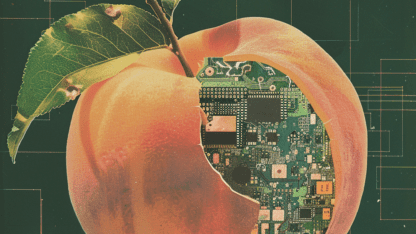Georgia can be seen across the silver screen, portraying locales from “Stranger Things” Hawkins, Indiana, to Wakanda, home of Marvel’s Black Panther.
And as artificial intelligence technology continues to expand into the entertainment business, Georgia productions could see new techniques filmmakers of the past could only dream of.
AI systems could automatically translate an actor’s dialogue into foreign languages, shifting their mouth movements to match the speech, while retaining their original voice and vocal performance. Directors could even use AI to reboot classic films without the expense of hiring a whole new team, said Frank Patterson, CEO of Trilith Studios in Atlanta, at a hearing of the Georgia Senate Committee on Artificial Intelligence.
“My son, when he was younger, didn’t want to watch a movie that was in black and white, and didn’t like the old language and the old tone,” he said. “We can fix all that now with these new AI tools. Which for those studios that have libraries of content – I didn’t want ‘Willy Wonka’ to be remade, the 1960s version. But they remade it. We should have just used the AI technologies to contemporize the story, right?”
Creating or altering a film in these ways could bring an avalanche of issues related to copyright and privacy laws.
Acworth Republican Sen. Ed Setzler questioned what all-digital actors and sets could mean for mega franchises like the Marvel cinematic universe and “Lord of the Rings.”
“Think about what salaries are for actors versus what if they had decided, ‘Hey you know what, we’re going to launch the whole MCU without actors at all. We’re not going to deal with their schedule, with their issues, they like to have the Diet Pepsi on set.’ All that stuff for people could just go away because we’re just going to manufacture it.”
“Then you have the side of going on set, I think about the ‘Lord of the Rings’ movies,” he added. “They went to New Zealand, had this incredible setting. If you were to say no talent, no New Zealand, we’re going to completely create that in the studio today. What’s the cost?”
Filmmakers are already using a process called virtual production to create virtual environments that rival real-world locations, Patterson said, but AI is still far from matching the brain of a talented actor.
“The reason Robert Downey Jr. gets the paycheck he gets is because something is going on in his brain, God help him, something is going on in his brain that causes him to respond the way he does, that causes us to really like him and love him and connect with him, and we are nowhere near close getting that,” he said. ”I would love to say to you, I can save X a million dollars, but that’s not going to happen.”
But while ChatGPT may not land a leading role anytime soon, directors have long used technology to create huge crowds for sports films or massive armies for battle scenes. Studios have libraries of nondescript faces based on real people, which raises questions for secondary performers, or extras.
“We will be creating humans that don’t exist,” Patterson said. “So I’m also stuck in this place where I want extras and all these great Georgians who are in movies to be able to get $100 and come watch a movie and enjoy it, and we’re actually showing real Georgians. If the cost gets too much, we can just put a bunch of humans that don’t exist digitally in the background and we’re not infringing on anyone’s rights, but we’re harming the actors at large. So this is a struggle that we don’t have an answer to right now, but I do think (there should be) clear protections from the state about how you can use image and likeness publicly and license it accordingly.”
Committee Chair John Albers expressed interest in a Tennesee law as a potential model for legislation in Georgia. The ELVIS Act – short for Ensuring Likeness Voice and Image Security – seeks to protect a person’s voice from improper use and adds liability to companies that provide tools that could be used to reproduce someone’s voice or likeness.
Members of Congress from both parties have proposed legislation aimed at protecting people from nonconsensual digital reproductions, but there is plenty of room for state regulations, and the Georgia film industry could be poised to benefit if it outplays other states, said Julie Feagin, CEO of Atlanta-based FilmBook Media,
She gave the example of a proposed New York law that would exclude productions from the state’s film tax credit if they use AI in a way that displaces a flesh and blood worker.
Georgia’s film tax credit is one of the most generous in the country.
“I can give you an example. They say that they want to have a synthetic performer as a stunt double because they’re afraid that an actual stunt double or actor would be damaged or hurt during the actual creation of the scene,” she said. “They want a synthetic performer. But then people will argue, no, you’ve done it in the past. You can use a stunt double. So then they’ll lose the tax credit even though they’re trying to protect their talent.”
“So there’s an opportunity because studios are saying they wanna leave New York,” she added. “They could come to Atlanta. So there’s an opportunity so you could pass legislation that would say, all right, you can use a synthetic double or you can perform or you can use a digital double, but then you’re gonna license the use of a real person here in Georgia, so the money stays here in Georgia.”
The Senate AI Committee is scheduled to continue to hold meetings through December, ahead of the legislative session’s kickoff in January. A House subcommittee on AI is scheduled to meet Thursday at the state Capitol.
This story was provided by WABE content partner the Georgia Recorder.









